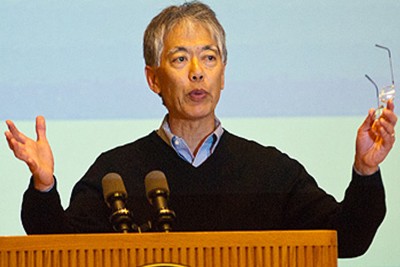 George Sugai, a professor in UConn’s Neag School of Education and an expert on school climate and student behavior, addressed a conference in February that included Vice President Joe Biden on the topic of making schools safer in the wake of the Sandy Hook School tragedy.
George Sugai, a professor in UConn’s Neag School of Education and an expert on school climate and student behavior, addressed a conference in February that included Vice President Joe Biden on the topic of making schools safer in the wake of the Sandy Hook School tragedy.
Sugai, who in December co-authored a national position paper on school violence following Newtown, told the invitation-only crowd of lawmakers, educators, political leaders, law enforcement officials, and others that preventing school violence at every level requires better communication between parents, students, teachers, and administrators.
“In most violent acts that occurred at school, somebody knew about the act before it occurred,” Sugai said, citing a recent Secret Service report that found at least one person knew beforehand of 80 percent of episodes of school violence.
“If we don’t have a means for communication, we’re not going to have the ability to put in place the things that are being discussed at this conference,” he said.
The conference was convened at Western Connecticut State University, with panel discussions moderated by U.S. Sens. Richard Blumenthal and Chris Murphy. Also speaking at the conference were Gov. Dannel P. Malloy, U.S. Rep. Elizabeth Esty, and experts on topics ranging from police work to psychology.
The keynote address was delivered by Biden, who called for stronger gun control laws and expanded attention to mental health care, saying the future will judge harshly if the country fails to act in the wake of Newtown.
“I cannot predict what will be written about us 20 or 30 years from now if we don’t act,” he said. “There’s a moral price to be paid for inaction.”
Sugai won applause from the attendees when he said the issue had to be taken as a whole, and that factors like communication and interpersonal relationships are critical to preventing school violence whether on the level of a Newtown or more commonplace incidents of bullying and related behavior.
The most important thing parents and educators can do, Sugai said, is make sure they’re involved with their children, to prevent a sense of isolation and the breakdown in communication channels that can lead to violence.
“I’m an optimist, and I really believe we can create a civil society, civil cultures, and civil neighborhoods,” he added. “We as individuals can actively do something today and tomorrow to change things for the better.”
 Facebook
Facebook
 Twitter
Twitter
 LinkedIn
LinkedIn
